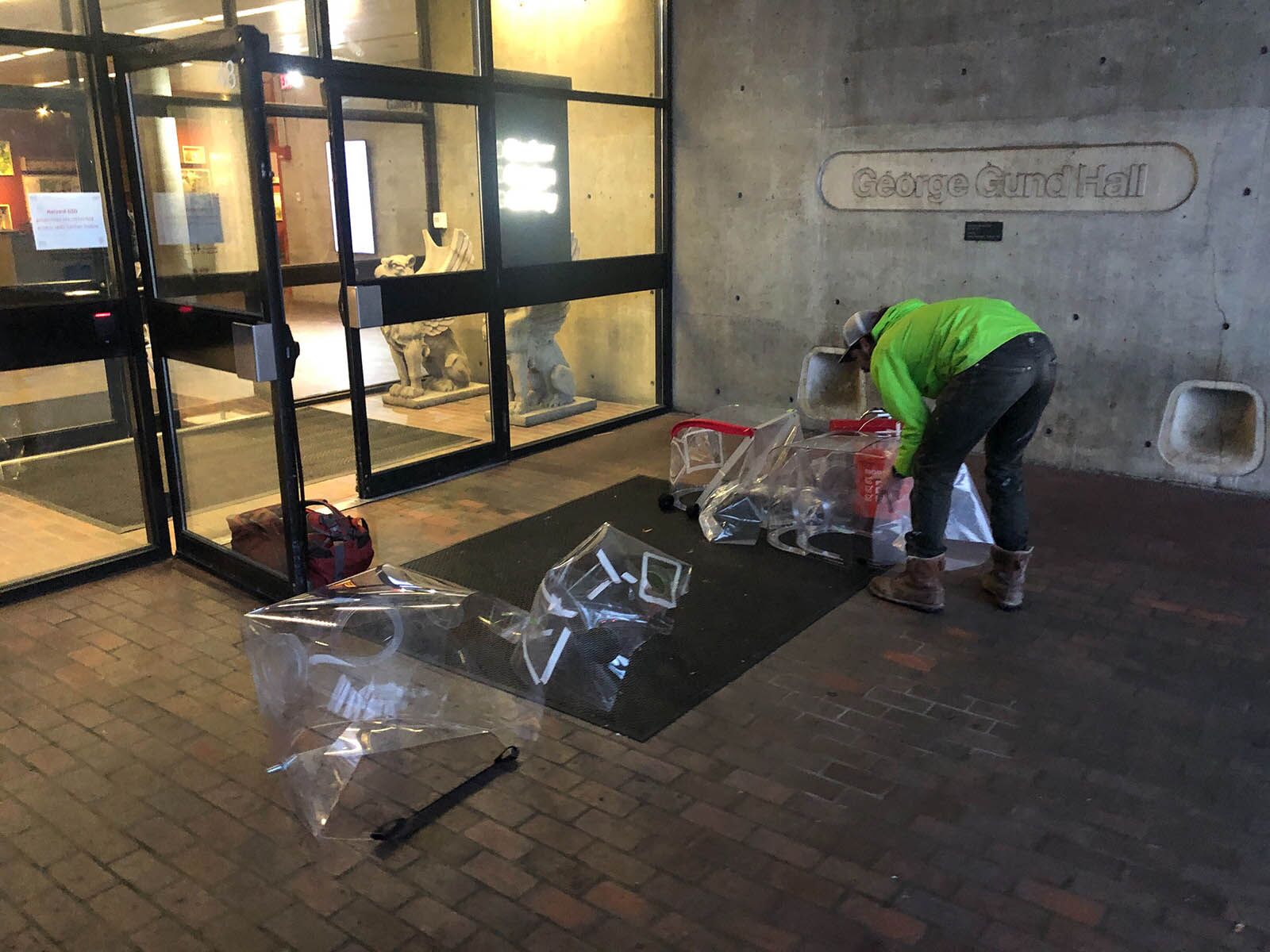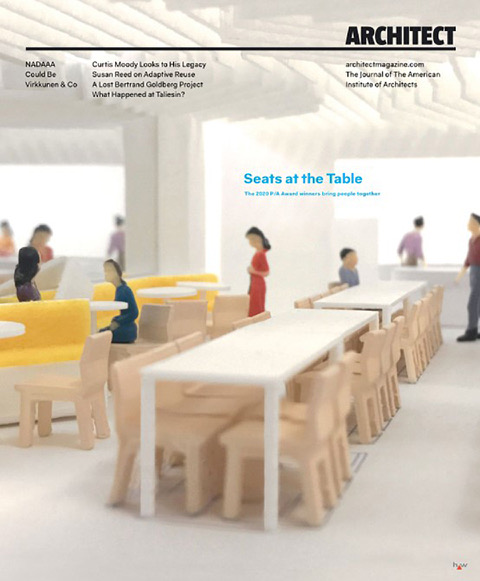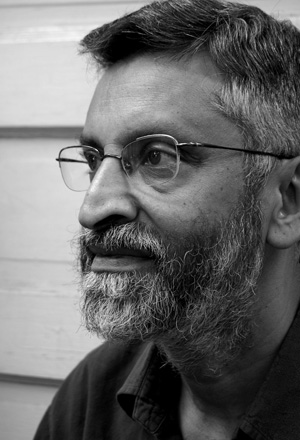2020 Graduating Student Award Recipients
Each year at commencement, the Harvard Graduate School of Design confers awards to graduating students that demonstrate exceptional scholarly achievement, leadership, and service. Congratulations to all the 2020 graduating student award recipients!
School-wide Awards
Gerald M. McCue Medal: Karan Saharya (MDes Critical Conservation ’20)
The Gerald M. McCue Medal is awarded each year to the student graduating from one of the school’s post professional degree programs who has achieved the highest overall academic record.
Digital Design Prize: Jia Jung (MArch I ’20)
The Digital Design Prize is presented by the Graduate School of Design to the student who has demonstrated the most imaginative and creative use of computer graphics in relation to the design professions.
Plimpton Poorvu Prize: MacKenzie Wasson (MArch I ’20) for his submission Building Biras: A Hurricane Adapted Caribbean Resort
The Plimpton-Poorvu Design Prize recognizes the top team or individual for a viable real estate project completed as part of the GSD curriculum that best demonstrates feasibility in design, construction, economics, and in fulfillment of market and user needs.
Peter Rice Prize: Peteris Lazovskis (MArch I ’20)
The Peter Rice prize honors students of exceptional promise in the school’s architecture and advanced degree programs who have proven their competence and innovation in advancing architecture and structural engineering.
Sinclair Kennedy Traveling Fellowship: Elena Brigitte Clarke (MDes Critical Conservation ’20) for study in Italy
The Sinclair Kennedy Traveling Fellowships support a full academic year of research at destinations outside of the United States.
Fulbright Grant: James Carrico (MArch II/MUP ’20) for study in Hong Kong
The Fulbright US Student Program is an international exchange program in the fields of education, culture, and science, offering advanced research, study, and teaching opportunities in over 140 countries.
Architecture Awards
American Institute of Architects Medal: Ian Miley (MArch I AP ’20)
The American Institute of Architects Medal is awarded to a professional degree student in the Master in Architecture graduating class who has achieved the highest level of excellence in overall scholarship throughout the course of their studies.
Alpha Rho Chi Medal: Milos Mladenovic (MArch I ’20)
The Alpha Rho Chi Medal, which is awarded to the graduating student who has achieved the best general record of leadership and service to the department, and who gives promise of professional merit through their character.
James Templeton Kelley Prize MArch I: Ian Miley (MArch I AP ’20) for “Stranger in Moscow: The Diplomatic Illusive
James Templeton Kelley Prize MArch II: Anna Goga (MArch II ’20) for “Porch House + 300 Panels, 400 Cuts, 400 Bandages”
The James Templeton Kelley Prize recognizes the best final design project submitted by a graduating student in the architecture degree programs.
Julia Amory Appleton Traveling Fellowship in Architecture: Radu-Remus Macovei (MArch I/MUP ’20)
The Julia Amory Appleton Traveling Fellowship is given to a student in the Department of Architecture on the basis of academic achievement as well as the worthiness of the project to be undertaken.
Kevin V. Kieran Prize: Nicolás Delgado Alcega (MArch II ’20)
Kevin V. Kieran Prize: Yotam Ben-Hur (MArch II ’20)
Kevin V. Kieran Prize: David Mitchell Kim (MArch II ’20)
The Kevin V. Kieran Prize recognizes the highest level of academic achievement among students graduating from the post-professional Master in Architecture program.
Dept. of Architecture Faculty Design Award MArch I: Euipoom Estelle Yoon (MArch I ’20)
Dept. of Architecture Faculty Design Award MArch II: Hee Young Pyun (MArch II ’20)
The Department of Architecture Faculty Design Award was established by the faculty of the Department of Architecture with the aim of recognizing significant achievement within a body of design work completed by a student at the GSD. This award is given to graduating students from each of the department’s two programs.
Landscape Architecture Awards
Thesis Prize in Landscape Architecture: Chelsea Kilburn (MLA I AP ’20) for “That Sinking Feeling: Subsidence Parables of the San Joaquin Valley“
The Landscape Architecture Thesis Prize is given to the graduating student who has prepared the best independent thesis during the past academic year.
2020 Landscape Architecture Foundation Olmsted Scholar: Nadyeli Quiroz (MDes/MLA I AP ’20)
Each year the faculty in the Department of Landscape Architecture nominates a student for the Landscape Architecture Foundation Olmsted Scholars Program. The program recognizes and supports students with exceptional leadership potential.
Norman T. Newton Prize: Siwen Xie (MLA I ’20)
The Norman T. Newton Prize is given to a graduating landscape architecture student whose work best exemplifies achievement in design expression as realized in any medium.
Pete Walker & Partners Fellowship for Landscape Architecture: Carson Fisk-Vittori (MLA I ’20)
Pete Walker & Partners Fellowship for Landscape Architecture: Danica Danielle Liongson (MDes Urbanism, Landscape, Ecology/MLA I 2020)
The Pete Walker and Partners Fellowship for Landscape Architecture is awarded to support travel and study for a graduating GSD student to advance their understanding of the body of scholarship and practices related to landscape design.
Jacob Weidenmann Prize: Jonathon Koewler (MLA I AP ’20)
The Jacob Weidenmann Prize is awarded to the student of the most distinguished design achievement graduating from the Department of Landscape Architecture.
ASLA Certificate of Merit: Michael Cafiero (MLA I AP ’20)
ASLA Certificate of Merit: Isaac W. Stein (MDes Risk & Resilience/MLA II ’20)
ASLA Certificate of Honor: Samuel Murdoch Gilbert (MLA I ’20)
Each year the faculty in the Department of Landscape Architecture nominates students for the American Society of Landscape Architecture Awards.
Charles Eliot Traveling Fellowship in Landscape Architecture: Andy Lee (MLA I AP/MUP ’20)
The Charles Eliot Traveling Fellowship is awarded annually as the highest honor by the Department of Landscape Architecture to one of its graduates.
Urban Planning and Design
Academic Excellence in Urban Planning: Amelia Muller (MUP ’20)
Academic Excellence in Urban Design: Soledad Patiño (MAUD ’20)
The Awards for Academic Excellence in Urban Planning and Urban Design honors graduating students from each of the programs who have achieved the highest academic record.
Award for Outstanding Leadership in Urban Planning: Emily McGovern Duma (MUP ’20)
Award for Outstanding Leadership in Urban Planning: Laura Greenberg (MAUD ’20)
The Award for Outstanding Leadership in Urban Planning and Urban Design honors graduating students from each of the programs who have demonstrated outstanding leadership during their time at the Graduate School of Design.
Urban Planning Thesis Prize: Margaret Haltom (MUP ’20) for “The Next Southern Landmark: A Roadmap to Confederate Monument Redesigns and RFP for the Site of a Former White Supremacist Statue“
Urban Design Thesis Prize: Justin Cawley (MAUD ’20), “Rescaling the University: Vertical Campuses and Postindustrial Urban Restructuring in Western Sydney“
The Department of Urban Planning and Design Thesis Prize is given to the graduating students in each of the programs who have prepared the best independent theses during the past academic year.
The Award for Excellence in Project-Based Urban Planning: Brett Alexander Merriam (MUP ’20)
The Award for Excellence in Project-Based Urban Planning is given to students who have demonstrated exceptional ability in urban planning projects including research and design studios throughout their course of study.
The Award for Excellence in Urban Design: Sarah Fayad (MLAUD ’20)
The Award for Excellence in Urban Design is given to students who have demonstrated exceptional design ability throughout their course of study in the Urban Design program.
AICP Outstanding Student Award: Juan Pablo Reynoso (MUP/MPP ’20)
The American Institute of Certified Planners Outstanding Student Award recognizes outstanding attainment in the study of planning by students graduating from accredited planning programs. The recipient of the award is chosen by a jury of planning faculty at each school.
Ferdinand Colloredo-Mansfeld Prize for Superior Achievement in Real Estate Studies: Patrick Braga (MUP ’20)
Ferdinand Colloredo-Mansfeld Prize for Superior Achievement in Real Estate Studies: Adriel Deller (MDes Real Estate & the Built Environment ’20)
The Ferdinand Colloredo-Mansfeld Prize for Superior Achievement in Real Estate Studies is awarded annually to a graduating student from any program who has exhibited superior academic accomplishment and leadership in real estate studies.
Druker Traveling Fellowship: Laura Greenberg (MAUD ’20) to study study Eco-Districts in the United States
Established in 1986, The Druker Traveling Fellowship is open to all students at the GSD who demonstrate excellence in the design of urban environments. It offers students the opportunity to travel in the United States or abroad to pursue study that advances understanding of urban design.
Design Studies
Dimitris Pikionis Award: Wilfred Guerron (MDes HPDM ’20)
The Dimitris Pikionis Award recognizes a student for outstanding academic performance in the Master in Design Studies degree program.
The Daniel L. Schodek Award for Technology and Sustainability: Xinzhu Chen (MDes Energy & Environments ’20)
The Daniel L. Schodek Award for Technology and Sustainability honors the memory and legacy of Professor Daniel Schodek and the standards of excellence he established during his 40 years of teaching and mentoring at the GSD. The award is given annually in recognition of the best Master in Design Studies thesis in the area of technology and sustainable design.
The Design Studies Thesis Prize: Angela Mayrina (MDes Art, Design & Public Domain) for “A Guidebook to an Empty Land: Kalimantan and the Shadows of the Capital“
The Design Studies Thesis Prize: Karan Saharya (MDes Critical Conservation ’20) for “In the Name of Heritage: Conservation as an Agent of Differential Development, Spatial Cleansing, and Social Exclusion in Mehrauli, Delhi“
The Design Studies Thesis Prize is given annually for the best thesis by a Master in Design Studies student.
Design Engineering
Overall Academic Performance: Mengxi Tan (MDE ’20)
The Overall Academic Performance award recognizes a graduating MDE student for outstanding academic performance in the Master in Design Engineering degree program.
Leadership and Community: Taylor Greenberg Goldy (MDE ’20)
Leadership and Community: Mia Zaidan (MDE ’20)
The Leadership and Community prize recognizes a graduating student who has displayed outstanding leadership and community building within the Design Engineering cohort and representation of MDE values to the larger world.
Outstanding Independent Design Engineering Project: Jacob Schonberger (MDE ’20) and Mengxi Tan (MDE ’20)
The Outstanding Design Engineering Project award honors one or more graduating MDE students who have presented the Design Engineering Project that contributes, in the most compelling way, to understanding and addressing a complex societal problem.
GSD participates in global, open-source effort to develop patient isolation hoods for Boston hospitals
Harvard University Graduate School of Design announces the rapid development of patient isolation hoods (PIH), in collaboration with clinicians at Mass General Brigham’s (MGB) Center for COVID Innovation and Boston Children’s Hospital (BCH). The GSD’s efforts have involved hundreds of designers, technical experts, and medical professionals from around the world in a community-led, open-source process, one that participants say could be a model for future modes of collaborative work and design.
Within two weeks, the design team was able to conceptualize and produce four flexible, lightweight PIH prototypes, delivering three to MGH on April 22 and one to BCH on April 24 for in-clinic evaluation. Patient isolation hoods act as a barrier between patients and healthcare providers to reduce providers’ risk of exposure to viruses and other contaminants during medical procedures.
Alongside the production of physical PIH, this collaborative process of design and evaluation has provoked reflections on the effort’s global, open-source, grassroots nature. Drawn from around the world and from various fields of study and expertise, more than 200 participants produced their designs and evaluations almost entirely via digital platforms, enabling the effort to be global in scope, rapid in pace, and uniquely collaborative.
“These patient isolation hoods are intended to be used in an environment that has extremely high and rigorous standards, and a normal structure and process of design and prototyping would take months or years to accomplish,” says Chris Hansen, digital fabrication specialist at the GSD’s Fabrication Laboratory . “Here, a design has been prototyped and put into a clinical environment in under a month. That was possible only by taking a new, non-hierarchical approach to design development, in which everyone is donating time and energy, and all stakeholders are empowered to make decisions independently.”
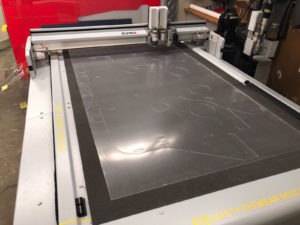
The GSD’s Fabrication Lab served as a production site throughout these PIH design efforts; equipped with CNC routers, laser cutters, Zund cutter, 3-D scanners, and other state-of-the-art technology, the Fabrication Lab ordinarily produces physical models for the GSD’s architecture, landscape architecture, urban planning, and urban design students and faculty.
These cross-institutional PIH efforts arose amid previously established, ongoing GSD work with the MGB Center for COVID Innovation, whose mission includes protecting front-line clinical staff and facilitating innovations that reduce the risk of COVID-19 transmission. Throughout March and April, the GSD—most specifically, its Fabrication Lab staff—produced thousands of 3-D-printed face shields and other personal protective equipment, or PPE, for MGB. By May 7, the GSD had fabricated close to 3,200 face shields and 2,200 face visors.
At the close of March, an ongoing Slack-based conversation among designers, doctors, and other contributors dedicated to PPE design had added PIH design to its focus. In consultation with participating doctors and clinicians, the collective team identified 25 critical design requirements for such hoods, including easy access for doctors’ arms and medical tools, rapid retractability in case of emergency, and negative air pressure, or suction, to move contaminants and air particles away from the attending doctor. Several days of meetings, design iterations, and test fabrication followed.
By April 10, after reviewing a series of PIH models, the team had developed consensus on one optimal design, dubbed “Apollo.” An “Apollo” prototype was delivered to Massachusetts General Hospital (MGH) on April 12 for clinical tests, after which it was approved for clinical use. Additional full-scale, fully operational “Apollo” prototypes were then fabricated at the GSD, three of them delivered to MGH on April 22 and one delivered to BCH on April 24. See an open-source compilation of “Apollo” design files via GitHub .
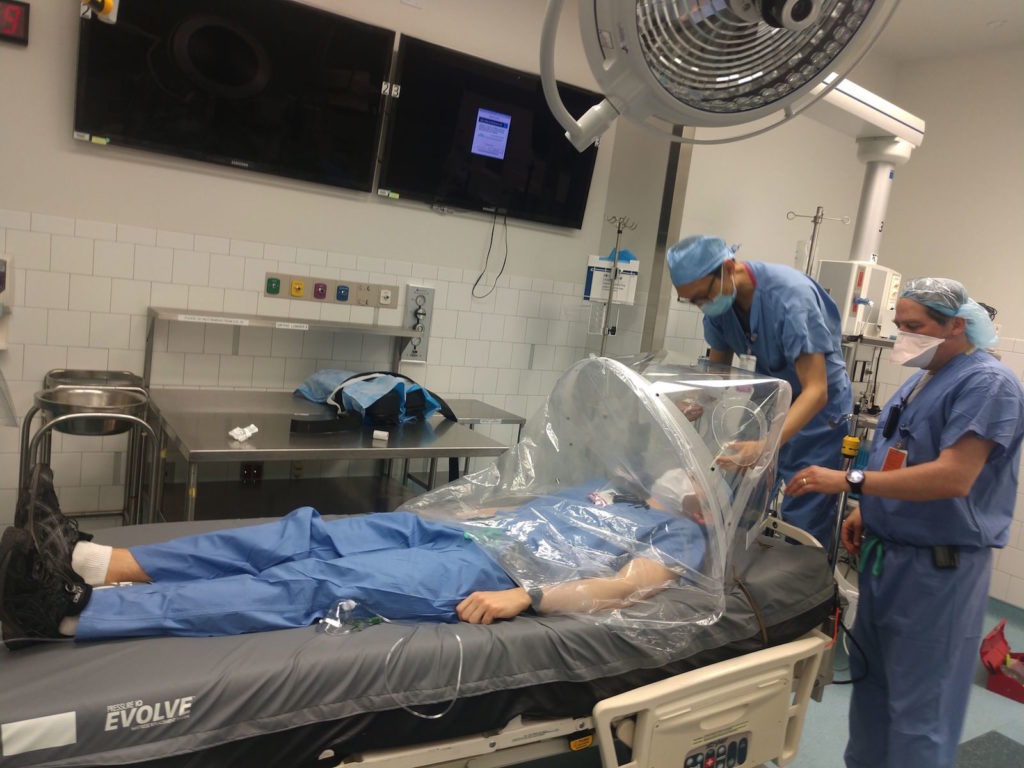
The design team’s various PIH prototypes are designed to function across hospital settings, whether emergency room, intensive care unit, or otherwise, and to allow ease of assembly, use, and disposal; they are composed of flat sheets of PETG plastic, with minimal need for joinery or panel construction. As an open-source design, the hoods can be fabricated anywhere in the world.
The PIH design and production process has inspired new perspectives on how design and medicine may join forces, throughout and beyond the ongoing COVID-19 crisis.
“The design process was unprecedented, partially because of the speed at which it was conducted, but also because of its ground-up, open-source, and collaborative design process,” observes Dr. Samuel Smith, MD, an anesthesiologist at MGH and instructor at Harvard Medical School (HMS) who participated in clinical review of these prototypes.
“Doctors and medicine need designers and design; good design leads to better, more effective equipment and resources, and eases physicians’ cognitive burden and fatigue. Despite the circumstances of this pandemic, the sight of so many doctors, designers, and others from around the world pooling expertise for the sake of a single effort has been empowering, giving us hope on many levels.”
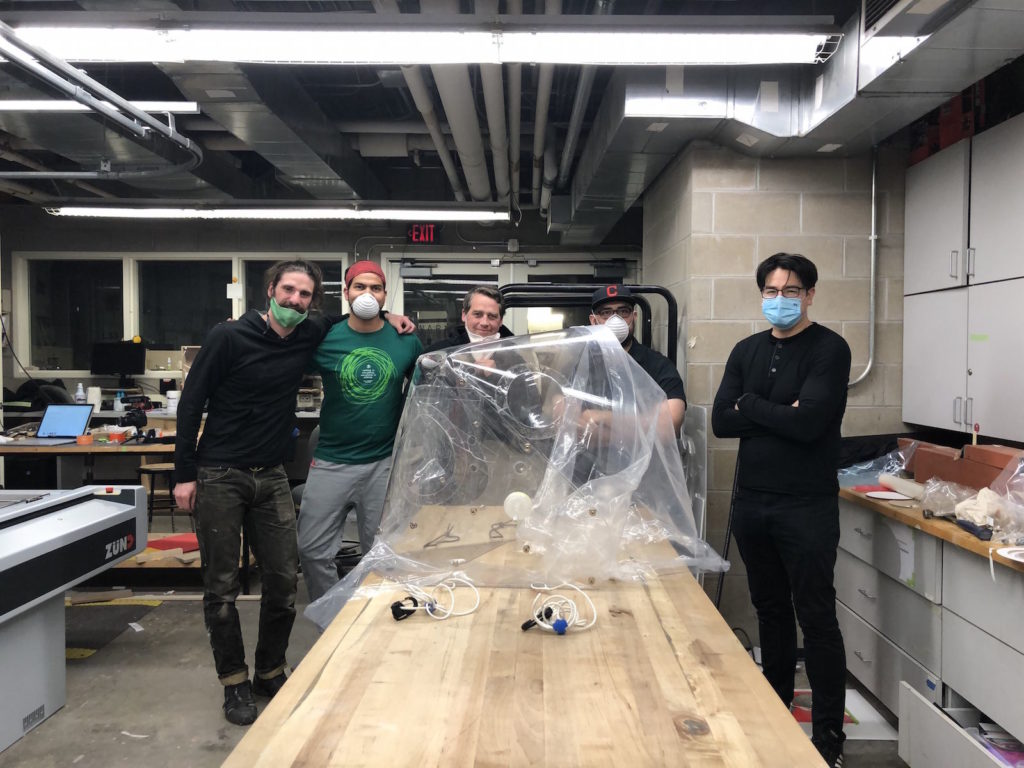
GSD names Jenny Odell the 2020 Class Day speaker
Harvard University’s Graduate School of Design has named Jenny Odell as its 2020 Class Day speaker. Odell will address the GSD’s Class of 2020 and their families during Harvard’s 2020 graduation exercises on Thursday, May 28. Odell’s talk is scheduled to begin approximately at 1:10 p.m. EST, to be streamed live on the GSD’s YouTube channel.
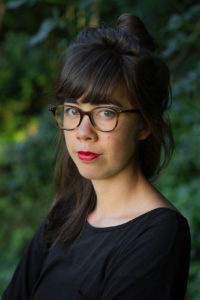
Artist and author Jenny Odell
Odell is an Oakland-based, multidisciplinary visual artist and writer whose work encourages close observation of the everyday. She has been an artist in residence at the San Francisco Planning Department, the Internet Archive, and Recology SF (a.k.a. “the dump”), and has exhibited at the Contemporary Jewish Museum, the New York Public Library, the Marjorie Barrick Museum (Las Vegas), Les Rencontres D’Arles, Fotomuseum Antwerpen, Fotomuseum Winterthur, La Gaîté Lyrique (Paris), the Lishui Photography Festival (China), and East Wing (Dubai). Her writing has appeared in the New York Times, New York magazine, the Paris Review, Sierra magazine, and McSweeney’s. Odell has taught studio art at Stanford University since 2013.
Odell’s New York Times-bestselling book, How to Do Nothing: Resisting the Attention Economy, was published by Melville House in 2019. The New York Times Book Reviews praised How to Do Nothing as “A complex, smart and ambitious book that at first reads like a self-help manual, then blossoms into a wide-ranging political manifesto.” The book was named a “best book of the year” for 2019 by a variety of critics and outlets, including Time magazine, The New Yorker, NPR, GQ magazine, Elle magazine, and Fortune magazine.
In 2016, feeling a sense of inability to create art, Odell found herself sitting and “doing nothing” in Oakland’s Rose Garden. It is there she formed the ideas that became How to Do Nothing, which she first discussed in a lecture at the 2017 EYEO technology conference and later posted on Medium, which went viral. In How to Do Nothing, Odell applies the lenses of art, philosophy, literature, historical events, and science to challenge readers to take a deeper look at the forces vying for our attention and how we respond. She describes human attention as the most precious—but the most overdrawn—resource we have. She observes that once people start paying a new kind of attention—one that transcends narratives of efficiency and techno-determinism—people can undertake bolder forms of political action, reimagine our role in the environment, and arrive at more meaningful understandings of happiness and progress.
To see a full schedule of 2020 Class Day and Diploma Ceremony exercises, please visit the GSD’s Commencement webpage.
March and April 2020 News Roundup
Bay State Commons Cohousing, a “typology-challenging 45,000-square-foot multifamily structure,” recently broke ground for construction. Designed by French 2D, an architecture studio co-founded by Assistant Professor in Practice of Architecture Jenny French, the project won a P/A Award from Architect Magazine. According to the studio, “The innovative 30-unit cohousing community is the first of its type under Malden’s newly created Cohousing Zoning Ordinance, the result of two years of incredible community work and support.”
A GSD team led by Montserrat Bonvehi Rosich, lecturer in Landscape Architecture; Seth Denizen, 2019–2020 Daniel Urban Kiley Fellow and lecturer in Landscape Architecture; and David Moreno Mateos, assistant professor of Landscape Architecture won a 2019 SOM Research Prize. Their project, “The Right to The Sewage,” will “evaluate the successes and failures of the Mezquital Valley as the world’s largest experiment in fertilizing agriculture with human wastewater. Almost 200,000 acres of land in the fertile Mezquital Valley are irrigated with the untreated sewage of Mexico City. The project will ask what hydraulic, soil, ecosystem, social, and policy conditions can increase chances for success and what its prospects for socio-ecological sustainability are.”
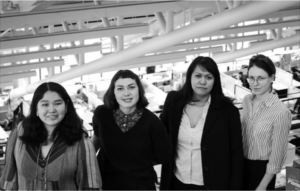
Zoë Toledo (MArch I ’23), Jaz Bonnin (MDes ’21), Heidi K. Brandow (MDes ’21), and Elsa Hoover (MArch I ’23)
Heidi K. Brandow (MDes ’21), Elsa Hoover (MArch ’23), Jaz Bonnin (MDes ’21), Zoë Toledo (MArch ’23), and Taylor Cook (MArch ’21) founded the Harvard Indigenous Design Collective (HIDC) with the mission to “support the education and work of our Indigenous architects, planners, designers, scholars, allies, and alumni of the Harvard Graduate School of Design. The HIDC promotes design by and for Indigenous communities as foundational to the history, theory, and practice of design fields on these Native homelands. The Harvard Indigenous Design Collective acknowledges that the land on which Harvard sits is the occupied territory of the Massachusett people, and a gathering place for nations since time immemorial.”
Nashra Balagamwala (MDes ’21) was named one of Forbes “30 Under 30” in The Arts. According to Forbes, Balagamwala “designed a board game to raise awareness about arranged marriage and its challenges. Other games she has created include Paltering Politicians, a card game that makes a statement about corruption and hypocrisy in politics.”
Michael Manfredi, design critic in Urban Planning and Design and expert-in-residence, and Marion Weiss, his partner at architecture firm Weiss/Manfredi, won the 2020 Thomas Jefferson Foundation Medal in Architecture. They are recognized for their work in redefining the relationship between landscape, architecture, and urbanism, which as UVA School of Architecture Dean Ila Berman notes, “not only underscores the significance that Thomas Jefferson attributed to these intertwined realms, but also speaks to the necessity, in our current age, to transcend traditional disciplinary boundaries and create newly integrated cultural-ecological paradigms.” Fellow recipients of this year’s awards include Sonia Sotomayor, associate justice of the Supreme Court; Dr. Rajiv J. Shah, president of the Rockefeller Foundation; and Ted Turner, media pioneer.
From 3D-printed face shields to strategies for a just recovery: How the Harvard Graduate School of Design community is contributing to COVID-19 response efforts
Amid the COVID-19 global pandemic, the Harvard Graduate School of Design community is working to leverage its skills and resources to contribute to response efforts. This website provides a centralized resource page for updates from across the GSD: news from the Fabrication Laboratory on production of Personal Protective Equipment (PPE) and other gear, relevant essays by leading design academics, remembrances of those we’ve lost, and other news from the GSD network.
News on Production of Medical Equipment
April 22, 2020: Face shield and Patient Isolation Hood (PIH) updates
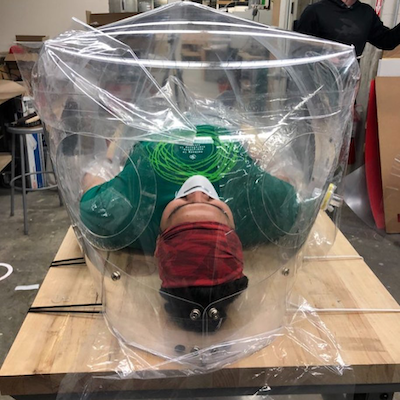
The Fabrication Lab has 3D printed 948 mounts/visor and laser cut 914 shields. As materials are replenished, staff will continue making gear in collaboration with what is requested by medical personnel.
Four Patient Isolation Hood (PIH) prototypes have been completed by a team led by GSD and Harvard colleagues working in the GSD’s Fabrication Lab. Three will be delivered to Massachusetts General Hospital and one will go to Boston Children’s Hospital for review.
April 15, 2020: GSD begins patient isolation hood (PIH) design and fabrication alongside ongoing PPE efforts
The GSD’s Digital Fabrication Specialist Chris Hansen has collaborated with an array of Harvard and GSD colleagues to design two PIH prototypes, fabricating them on April 13 and delivering them to Massachusetts General Hospital (MGH) on April 14. Hansen and colleagues spent much of April 15 on continued design and prototyping; by the end of this week, the GSD aims to have produced between 20 and 30 PIHs for a trial run in MGH’s intensive care unit. Read more.
April 7, 2020: GSD begins producing personal protective equipment (PPE) for Boston-area hospitals
With a stable of 3-D printers, other state-of-the-art fabrication technologies, and expert guidance from across Harvard University, the Harvard Graduate School of Design has begun production of personal protective equipment, or PPE, for front-line medical personnel at area hospitals. GSD fabrication began on April 5, and on April 6, the school delivered a first run of 90 face shields to Brigham and Women’s Hospital (BWH) and set up over one hundred 3-D printers in the school’s Gund Hall for continued production. Read more.
March 26, 2020: GSD’s Fabrication Lab facilities being considered for possible production of medical supplies

GSD Assistant Dean for Information Technology Stephen Ervin and 3-D Fabrication Specialist Chris Hansen have been in consultation with the newly formed Mass General Brigham (MGB) Center for COVID Innovation to explore whether and how the GSD’s Fabrication Lab facilities, including 3-D printers, might be put to work to address critical shortages in Personal Protective Equipment (PPE) for front-line medical personnel—PPE such as face masks, and diagnostic aids such as nasopharyngeal test swabs. Together with the GSD’s Martin Bechthold, Kumagai Professor of Architectural Technology and Director of the Doctor of Design Studies and Master in Design Engineering programs, Ervin and Hansen are coordinating with other Harvard partners. Read more.
Essays from GSD Scholars
Jeffrey Schnapp on the spatial logic of quarantine: “When the world is again unparked, will it know how to unplug?”
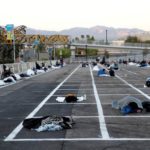
“Being grounded has a way of regrounding people’s values and I am persuaded that shelter-in-place policies are fostering a new hyperlocalism—a rerooting in situ that is likely to continue to favor walkable and bikeable mobility over long-distance displacements.” Jeffrey Schnapp holds the Carl A. Pescosolido Chair in Italian and Comparative Literature in the Faculty of Arts and Sciences and is also affiliated with the Department of Architecture at Harvard’s Graduate School of Design. Read more.
Resources for a just recovery from the GSD’s CoDesign Field Lab
“The coronavirus outbreak has both revealed and exacerbated structural inequities in American cities. Challenges faced by low- and moderate-income communities have escalated during the pandemic, with respect to housing insecurity, precarious work arrangements, lack of access to healthcare and affordable childcare, and a shortage of safe and healthy recreational spaces.” This post was written in the context of the Harvard Graduate School of Design’s project-based research seminar “CoDesign Field Lab: Program Evaluation for Change Leadership” (Spring 2020). Read more.
A radical transformation in building and designing for health is underway—but not everyone will benefit equally
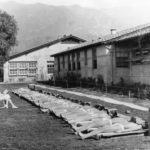
GSD faculty including Malkit Shoshan, Rahul Mehrotra, Stephen Gray, Martha Schwartz, Michael Hooper, and Chris Reed examine the positive and negative implications of designing for health, particularly for marginalized and oppressed communities. Read more.
The pandemic has caused an unprecedented reckoning with digital culture. Architecture may never be the same again (and why that’s okay)

Reflections on creating architectural culture online during the pandemic, based on interviews with members of the GSD community: Jeanne Gang, Antoine Picon, Jose Luis García del Castillo y López, Michelle Chang, Ana Miljački, Lisa Haber-Thomson, and Dan Sullivan. Read more.
Pandemics and the future of urban density: Michael Hooper on hygiene, public perception and the “urban penalty”

“Prior to the pandemic, I was intrigued by the relative lack of empirical, contemporary research on the relationship between hygiene and attitudes toward density. This gap was particularly interesting because there is a substantial body of fascinating tangential evidence that suggests people’s attitudes to urban density might be influenced by hygiene concerns.” Michael Hooper is Associate Professor of Urban Planning. Read more.
How to mitigate the impact of an epidemic and prevent the spread of the next viral disease: A guide for designers
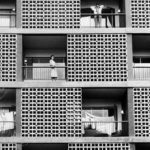
“Designers play an essential role in the prevention, control, and response of many of these diseases, so getting involved is not a matter of a choice anymore, but a duty.” Dr. Elvis Garcia is an expert in epidemics and a lecturer in the Department of Architecture. Read more.
What role do planning and design play in a pandemic? Ann Forsyth reflects on COVID-19’s impact on the future of urban life

“For the past decades, those looking at the intersections of planning, design, and public health have focused less on infectious diseases and more on chronic disease, hazards and disasters, and the vulnerable. The current pandemic brings the question of designing for infectious diseases back to the forefront and raises important questions for future research and practice.” Ann Forsyth is Ruth and Frank Stanton Professor of Urban Planning. Read more.
In Memoriam
Michael McKinnell (1935-2020); Professor and Boston City Hall architect

Michael McKinnell, a fixture at the Harvard Graduate School of Design and in the architectural canon, died on March 27 at the age of 84 from COVID-19-induced pneumonia. He is survived by his wife, Stephanie Mallis (MArch ’78), and two daughters. As co-founder of Kallmann, McKinnell and Knowles, McKinnell’s built projects include Boston City Hall, Hynes Convention Center, and Harvard Law School’s Hauser Hall. At the GSD, he enjoyed a storied teaching career, joining the Department of Architecture faculty in 1966 and being named as the Nelson Robinson, Jr. Professor of Architecture in 1983, a role he held until 1988. Read more.
Michael Sorkin (1948–2020); Architect, designer, critic, pedagogue

Michael Sorkin died on March 26, 2020, at the age of 71 after contracting the coronavirus. For decades, Sorkin contributed inspiration, incisive criticism, and forward-minded design around the halls of the Harvard GSD. He studied at the GSD in the 1970s and taught there in 2002 and in 2015. He also participated in a variety of review panels and public programs over the decades, including 2015’s “Writing Architecture.” Read more.
GSD shortlists three architects for 2020 Wheelwright Prize
The Harvard Graduate School of Design has announced three shortlisted architects for the 2020 Wheelwright Prize. Now in its eighth cycle, the Wheelwright Prize supports innovative design research, crossing both cultural and architectural boundaries, with a $100,000 grant intended to support two years of study. Previous winners have presented diverse research proposals, including studies of kitchen typologies around the world; the architecture and culture of greenhouses; and material flows and techniques as used in the design and construction of film sets. The 2020 Wheelwright Prize drew 168 applicants from over 45 countries. A first-phase jury deliberation was conducted in early March; a winner will be selected in late April. Wheelwright Prize finalists traditionally present their work and proposal to an audience and panel of jurors at Harvard GSD, with a winner named in April. However, given the unprecedented global context created by the COVID-19 crisis, the 2020 Wheelwright Prize cycle is being conducted almost entirely via digital means. The first phase of jury deliberations was conducted via Zoom teleconferencing in early March, and finalist presentations will be conducted similarly throughout April. Such focus on digitally grounded dialogue mirrors similar efforts being applied across Harvard GSD and the field of architecture, as architects and designers confront a new landscape for practice and teaching. This year’s jury includes 2016 Wheelwright Prize Winner Anna Puigjaner; Harvard GSD’s Dean and Josep Lluís Sert Professor of Architecture, Sarah M. Whiting; Harvard GSD’s Chair of the Department of Architecture, Mark Lee; Harvard GSD Assistant Professor of Architecture Megan Panzano; British architect Tom Emerson; and Belgian architect Wonne Ickx.2020 Wheelwright Prize Finalists
The three finalists for the 2020 Wheelwright Prize, and their proposals, are: Daniel Fernández Pascual holds a Master of Architecture from ETSA Madrid, a Master of Science in Urban Design from TU Berlin and Tongji University Shanghai, and a PhD from the Centre for Research Architecture, Goldsmiths, University of London. His thesis Financial Littorals: The Architecture of Profit Margins and Ambiguous Lands investigated the spatial construction of the Spanish shoreline to track the ripple effects of the 2007-2008 real estate crisis. In 2013 he co-founded Cooking Sections with Alon Schwabe. Based in London, their work explores systems that organize the world through food. Using installation, performance, mapping and video, their research-based practice operates within the overlapping boundaries of architecture, visual culture, and ecology.
Since 2015 Cooking Sections have worked on multiple iterations of the long-term site-specific CLIMAVORE project, exploring how to eat as humans change climates. In 2016 they opened The Empire Remains Shop, a platform to critically speculate on the implications of selling the remains of Empire today. The eponymous book about the project was published by Columbia Books on Architecture and the City in 2018. Cooking Sections was part of the exhibition at the U.S. Pavilion in the 2014 Venice Architecture Biennale. Their work has also been exhibited widely; upcoming solo exhibitions will take place at Tate Britain and SALT Istanbul, as well as a new commission for P.5 New Orleans Triennial.
In 2019, Cooking Sections won the Future Generation Special Art Prize and were shortlisted for the Visible Award for socially-engaged practices. Cooking Sections currently lead a studio unit investigating critical questions around refuse and the metabolization of the built environment at the School of Architecture, Royal College of Art, London.
With proposal Being Shellfish: The Architecture of Intertidal Cohabitation, Fernández Pascual posits that, as awareness about the environmental footprint of construction increases, the intertidal zone can offer more responsive ways to inhabit the planet and provide regenerative materials. Seaweeds and shellfish are key sources of nutrients and have been used in construction over millennia, he observes. By looking at waste shells and seaweed material cultures in Chile, Taiwan, China, Turkey, Japan, Zanzibar, Denmark, and New Zealand, “Being Shellfish” continues Fernández Pascual’s ongoing investigation on ecosocial coastal innovations on the intertidal zone.
Daniel Fernández Pascual holds a Master of Architecture from ETSA Madrid, a Master of Science in Urban Design from TU Berlin and Tongji University Shanghai, and a PhD from the Centre for Research Architecture, Goldsmiths, University of London. His thesis Financial Littorals: The Architecture of Profit Margins and Ambiguous Lands investigated the spatial construction of the Spanish shoreline to track the ripple effects of the 2007-2008 real estate crisis. In 2013 he co-founded Cooking Sections with Alon Schwabe. Based in London, their work explores systems that organize the world through food. Using installation, performance, mapping and video, their research-based practice operates within the overlapping boundaries of architecture, visual culture, and ecology.
Since 2015 Cooking Sections have worked on multiple iterations of the long-term site-specific CLIMAVORE project, exploring how to eat as humans change climates. In 2016 they opened The Empire Remains Shop, a platform to critically speculate on the implications of selling the remains of Empire today. The eponymous book about the project was published by Columbia Books on Architecture and the City in 2018. Cooking Sections was part of the exhibition at the U.S. Pavilion in the 2014 Venice Architecture Biennale. Their work has also been exhibited widely; upcoming solo exhibitions will take place at Tate Britain and SALT Istanbul, as well as a new commission for P.5 New Orleans Triennial.
In 2019, Cooking Sections won the Future Generation Special Art Prize and were shortlisted for the Visible Award for socially-engaged practices. Cooking Sections currently lead a studio unit investigating critical questions around refuse and the metabolization of the built environment at the School of Architecture, Royal College of Art, London.
With proposal Being Shellfish: The Architecture of Intertidal Cohabitation, Fernández Pascual posits that, as awareness about the environmental footprint of construction increases, the intertidal zone can offer more responsive ways to inhabit the planet and provide regenerative materials. Seaweeds and shellfish are key sources of nutrients and have been used in construction over millennia, he observes. By looking at waste shells and seaweed material cultures in Chile, Taiwan, China, Turkey, Japan, Zanzibar, Denmark, and New Zealand, “Being Shellfish” continues Fernández Pascual’s ongoing investigation on ecosocial coastal innovations on the intertidal zone.
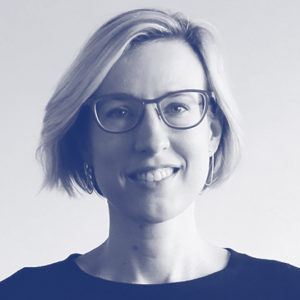 Bryony Roberts is an architectural designer and scholar. Her practice Bryony Roberts Studio, based in New York, integrates methods from architecture, art, and preservation to address complex social conditions and urban change. The practice has been awarded the Architectural League Prize and New Practices New York from AIA New York as well as support from the National Endowment for the Arts, the Graham Foundation, the MacDowell Colony, and the American Academy in Rome, where Roberts was awarded the Rome Prize for 2015-2016. In tandem with her design practice, Roberts instigates research and publication projects about designing in response to social and cultural histories. She guest-edited the recent volume Log 48: Expanding Modes of Practice, edited the book Tabula Plena: Forms of Urban Preservation published by Lars Müller Publishers, and co-guest-edited Log 31: New Ancients. She has also published her research in Harvard Design Magazine, Praxis, Future Anterior, and Architectural Record.
Roberts earned her Bachelor of Arts at Yale University and her Master of Architecture at the Princeton School of Architecture, where she was awarded the Suzanne Kolarik Underwood Thesis Prize and the Henry Adams AIA Medal. She teaches architecture and preservation at the Columbia University Graduate School of Architecture, Planning and Preservation in New York.
With The Architecture of Childcare: A Global Study of Experimental Models, Roberts proposes an analysis of experimental models of care that hybridize programs to improve conditions for children, families, and care workers: childcare plus housing, childcare plus workplace, and childcare plus landscape. Comparing projects in Scandinavia, the UK, the US, Japan, and Southeast Asia through analytical drawings and contextual research, Roberts seeks to yield a global catalogue of new typologies.
Bryony Roberts is an architectural designer and scholar. Her practice Bryony Roberts Studio, based in New York, integrates methods from architecture, art, and preservation to address complex social conditions and urban change. The practice has been awarded the Architectural League Prize and New Practices New York from AIA New York as well as support from the National Endowment for the Arts, the Graham Foundation, the MacDowell Colony, and the American Academy in Rome, where Roberts was awarded the Rome Prize for 2015-2016. In tandem with her design practice, Roberts instigates research and publication projects about designing in response to social and cultural histories. She guest-edited the recent volume Log 48: Expanding Modes of Practice, edited the book Tabula Plena: Forms of Urban Preservation published by Lars Müller Publishers, and co-guest-edited Log 31: New Ancients. She has also published her research in Harvard Design Magazine, Praxis, Future Anterior, and Architectural Record.
Roberts earned her Bachelor of Arts at Yale University and her Master of Architecture at the Princeton School of Architecture, where she was awarded the Suzanne Kolarik Underwood Thesis Prize and the Henry Adams AIA Medal. She teaches architecture and preservation at the Columbia University Graduate School of Architecture, Planning and Preservation in New York.
With The Architecture of Childcare: A Global Study of Experimental Models, Roberts proposes an analysis of experimental models of care that hybridize programs to improve conditions for children, families, and care workers: childcare plus housing, childcare plus workplace, and childcare plus landscape. Comparing projects in Scandinavia, the UK, the US, Japan, and Southeast Asia through analytical drawings and contextual research, Roberts seeks to yield a global catalogue of new typologies.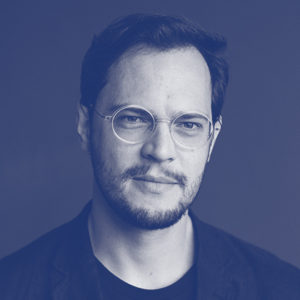 Born in Curitiba, Brazil, Gustavo Utrabo received a degree in architecture and urbanism from the Federal University of Paraná in Curitiba, Brazil, in 2010. In 2014, he also completed a specialization course in National History and Literature from UTFPR. Through his studio, Estúdio Gustavo Utrabo, he intends to expand the architecture field, connect people, and imagine the future through sustainable and inclusive approaches. These approaches come together in an extensive portfolio that has earned significant awards as the RIBA International Prize (2018), RIBA International Emerging Architect (2018), finalist status in Harvard GSD’s 2018 Wheelwright Prize, and a “Highly Commended” award in the Architectural Review Emerging Architecture Awards (2019), among others. Utrabo has contributed to lectures and other actions in institutions including IIT Chicago, University of Hong Kong, Future Architecture Platform at MAO museum in Ljubljana, RIBA London, and FAU-USP in São Paulo, among others. Utrabo recently served as a visiting professor in the Master of Arts program at the University of Hong Kong.
Eyeing intersections between culture, nature, and economics, especially amid ongoing climate change, Utrabo proposes an investigation into merging nature and culture through matter. With Rethinking Nature, Assembling Matter, he seeks an understanding of how wood, from its natural, raw status to its final use in architecture, can be used as a primordial resource to compose a cultural manifestation.
Born in Curitiba, Brazil, Gustavo Utrabo received a degree in architecture and urbanism from the Federal University of Paraná in Curitiba, Brazil, in 2010. In 2014, he also completed a specialization course in National History and Literature from UTFPR. Through his studio, Estúdio Gustavo Utrabo, he intends to expand the architecture field, connect people, and imagine the future through sustainable and inclusive approaches. These approaches come together in an extensive portfolio that has earned significant awards as the RIBA International Prize (2018), RIBA International Emerging Architect (2018), finalist status in Harvard GSD’s 2018 Wheelwright Prize, and a “Highly Commended” award in the Architectural Review Emerging Architecture Awards (2019), among others. Utrabo has contributed to lectures and other actions in institutions including IIT Chicago, University of Hong Kong, Future Architecture Platform at MAO museum in Ljubljana, RIBA London, and FAU-USP in São Paulo, among others. Utrabo recently served as a visiting professor in the Master of Arts program at the University of Hong Kong.
Eyeing intersections between culture, nature, and economics, especially amid ongoing climate change, Utrabo proposes an investigation into merging nature and culture through matter. With Rethinking Nature, Assembling Matter, he seeks an understanding of how wood, from its natural, raw status to its final use in architecture, can be used as a primordial resource to compose a cultural manifestation.
Dilip da Cunha awarded a 2020 Guggenheim Fellowship
Dilip da Cunha, lecturer in urban planning and design at the Harvard Graduate School of Design, is one of two Harvard University professors among the 2020 Guggenheim Fellowship’s 175 awardees. Since its establishment in 1925, the John Simon Guggenheim Memorial Foundation has granted Guggenheim Fellowships to scores of Nobel laureates, Fields Medalists, poets laureate, members of the national academies, winners of the Pulitzer Prize, Turing Award, Bancroft Prize, National Book Award, and many other internationally recognized honors. This year, the foundation awarded its fellowships to a diverse group of 175 writers, scholars, artists, and scientists, chosen through a rigorous peer-review process from almost 3,000 applicants in the Foundation’s ninety-sixth competition. Collectively, the 2020 Fellows represent 53 scholarly disciplines and artistic fields. Da Cunha is an architect and planner, with practice based in Philadelphia and Bangalore. In addition to his role as lecturer in urban planning and design at the GSD, he co-directs the GSD’s Master in Design Studies program’s Risk and Resilience concentration, and is an adjunct professor at Columbia University’s GSAPP. Da Cunha’s latest book is The Invention of Rivers: Alexander’s Eye and Ganga’s Descent (University of Pennsylvania Press, 2018); the book and its subject matter were the topic of Da Cunha’s 2019 Daniel Urban Kiley Lecture at the GSD. He is also author, with Anuradha Mathur, of Mississippi Floods: Designing a Shifting Landscape (2001); Deccan Traverses: The Making of Bangalore’s Terrain (2006); Soak: Mumbai in an Estuary (2009); and Design in the Terrain of Water (2014). In 2017, Mathur and da Cunha launched Ocean of Rain, a design platform that seeks to situate the past, present, and future of habitation in a ubiquitous wetness rather than on a land-water surface. Also in 2017, Mathur and da Cunha received a Pew Fellowship Grant. “I am honored to be named a Fellow of the John Simon Guggenheim Memorial Foundation,” da Cunha says. “It will go a long way in furthering the Ocean of Rain project that I am working on as a sequel to The Invention of Rivers. It is a project that I hope will make a difference on how we see and design our ground of habitation and infrastructure, particularly in the wake of the current crisis.” Created by Senator Simon and Olga Guggenheim in memory of their son, the Guggenheim Fellowship program remains a significant source of support for artists, scholars in the humanities and social sciences, and scientific researchers. In addition to the generous support of Senator Simon and Mrs. Olga Guggenheim, new and continuing donations from friends, Trustees, former Fellows, and other foundations have ensured that the John Simon Guggenheim Memorial Foundation will maintain its historic mission. An exceptionally generous bequest in 2019 from the estate of the great American novelist Philip Roth, a Fellow in 1959, is providing partial support for the wide variety of writers supported by the Foundation. The full text of the 2020 Guggenheim Fellowship news is available via the Guggenheim Foundation announcement.GSD announces April 2020 virtual events series
Harvard Graduate School of Design has organized a series of virtual public lectures across the month of April, an effort toward sharing and stoking design discourse amid today’s almost-entirely digital context. GSD faculty including Dan D’Oca, Oana Stănescu, Jenny French, and David Moreno Mateos will offer looks into their ongoing and upcoming design preoccupations, while voices from outside the school bring welcomed insights and dialogue. The GSD’s series of talks and webinars will be broadcast to our audiences via Zoom and live-streamed to the GSD’s Facebook page. Only viewers who are attending the lecture via Zoom will be able to submit questions for the Q+A. Zoom viewers must register to attend each lecture via the respective lecture’s webpage, available below; once registered, guests will be provided with a link to join the lecture via Zoom. The April 2020 virtual events series includes: Tuesday, April 7, 12:00 pm EST Daniel D’Oca, “Who What Where” D’Oca is Associate Professor in Practice of Urban Planning at the Harvard Graduate School of Design and Principal and Co-Founder of Interboro Partners, a New York City-based architecture, urban design, and urban planning firm. Designers and planners do community engagement for all kinds of reasons, D’Oca argues; for some, it’s a scope requirement that results in empty evening meetings and obligatory “dotmocracy” activities. At worst, it’s an act of coercion: an opportunity to sell a predetermined, independently-generated idea to an unwilling public whose support is needed for approval. Increasingly, community engagement events are PR platforms—photo ops staged to showcase a designer’s willingness to work with “the community.” Rarely is community engagement what it should be, namely, an open-ended, inclusive, and meaningful (and fun!) dialogue that generates something unique and site-specific. In this talk, Dan will talk about some of Interboro’s recent and not-so-recent adventures in community co-design, in which they have deployed engagement, close observation, and learning tools to create regional, citywide, and neighborhood plans, parks and open spaces, public art installations, and other co-authored urban environments.. Friday, April 10, 12:00 pm EST Oana Stănescu, “Breather” Stănescu is a Design Critic in Architecture at Harvard GSD and runs her eponymous design studio from New York. In this lecture, she will discuss the design process seen through the lens of a range of projects in progress. Stănescu’s projects include the collaborative +POOL, a floating, water filtering swimming pool, as well as a wide range of collaborations with Nike, Virgil Abloh, The Office of PlayLab, 2×4, Arup, New Museum, the Storefront for Art and Architecture, Need Supply, Fool’s Gold, and many more. Stănescu’s work has been celebrated in publications such as The New York Times, Forbes, Madame Figaro, Architect magazine, New York magazine, Mark, Time magazine, and Cultured, to name a few. Prior to establishing her own studio she was a co-founder of the New York-based practice Family. Monday, April 13, 12:00 pm EST Aga Khan Program Lecture: Laleh Khalili, “Tankers, Tycoons, and the Making of Modern Regimes of Law, Labor, and Finance” Khalili is a Professor of International Politics at Queen Mary University of London, and the author of Heroes and Martyrs of Palestine (Cambridge, 2007) and Time in the Shadows: Confinement in Counterinsurgencies(Stanford, 2013). Her Sinews of War and Trade, on the politics of maritime infrastructures, is published by Verso. Focusing on the tanker terminals of the Arabian Peninsula since the 1930s and the subsequent burgeoning of tanker-ships plying the trade between the Peninsula and the rest of the world, Khalili will illuminate the radical changes in political economy, labor, law, and production the specificities of tanker trade has wrought. Friday, April 17, 12:00 pm EST French 2D (Anda and Jenny French), “Together Again” French 2D is Boston-based architecture studio founded by Anda and Jenny French. Their intimate knowledge of Boston, where the sisters were born and raised, allows the close practice to be both deeply engaged and work critically with local issues of housing, public space, history and identity. French 2D works on housing and mixed-use projects with a focus on strange housing types that combine familiar ideas of home with radical organizations and typologies, found in their cohousing and micro-housing projects. The practice also works on civic installations and exhibitions that call upon the domestic to bring people together for familiar rituals in unfamiliar spaces, found in serial dinner-parties, fuzzy bartering environments, and out-scaled dresses. Saturday, April 18, 12:00 pm EST Heinz Emigholz and Anselm Franke, “Goff in the Desert” A live, online screening of Heinz Emigholz’s Goff in the Desert, a sweeping, cinematic meditation on 62 buildings designed by the American architect Bruce Goff. Apprenticed at age 12 but never formally educated as an architect, Goff’s work followed its own trajectory, apart from most 20th-century architecture. Goff in the Desert is one installment of a series of films Emigholz has made under the title Architecture as Autobiography. The screening will be preceded by a conversation between Emigholz and curator Anselm Franke. Tuesday, April 21, 12:00 pm EST David Moreno Mateos Moreno Mateos is an Assistant Professor of Landscape Architecture at Harvard GSD and a restoration ecologist interested in understanding the long-term recovery of ecosystems degraded by human development. He is interested in estimating how long it takes for ecosystems to recover their less resilient attributes, like the interactions among soil organisms and plants. Understanding this will allow for the discovery of tools to increase the currently limited performance of ecosystem restoration, and increase our ecological understanding of landscape architecture. To do so, he investigates how the structure of species interactions and the deriving functionality of recovering ecosystems re-assemble over the long term. Thursday, April 23, 6:30 pm EST David Joselit, “Heritage and Debt: Art in Globalization” Joselit is Professor of Art, Film, and Visual Studies in Harvard’s Department of Art, Film, and Visual Studies. Globalization has generated a new model of regional museums of modern and contemporary art whose purpose, Joselit argues, is to develop an alternative to the authority of the so-called Encyclopedic Museums of former imperial capitals in the West, such as London, Paris, and Vienna—a type that can no longer be reproduced. In this lecture, he will consider the National Gallery Singapore, The Zeitz Museum of Contemporary Art Africa, M+ Hong Kong, and the Louvre Abu Dhabi as exemplars of a new model in which the universality associated with European encyclopedic museums are replaced by claims of regional representation whose expansive territorial ambitions are grounded by archaeological situatedness in a local site or culture, often literally through the repurposing and reanimation of existing buildings.GSD’s Fabrication Lab facilities being considered for possible production of medical supplies
Members of the Harvard GSD community are proactively exploring how we might best leverage our skills and resources to help with the COVID-19 outbreak and its impacts in any ways that we can. Most recently, the GSD’s Assistant Dean for Information Technology Stephen Ervin and 3-D Fabrication Specialist Chris Hansen have been in consultation with the newly formed Mass General Brigham (MGB) Center for COVID Innovation to explore whether and how the GSD’s Fabrication Lab facilities, including 3-D printers, might be put to work to address critical shortages in Personal Protective Equipment (PPE) for front-line medical personnel—PPE such as face masks, and diagnostic aids such as nasopharyngeal test swabs. Together with the GSD’s Martin Bechthold, Kumagai Professor of Architectural Technology and Director of the Doctor of Design Studies and Master in Design Engineering programs, Ervin and Hansen are coordinating with other Harvard partners, including the John A. Paulson School of Engineering and Applied Sciences (SEAS), the Wyss Institute for Biologically Inspired Engineering, Harvard Medical School, and the Harvard T.H. Chan School of Public Health. The MGB Center for COVID Innovation is organizing working groups to find rapid ways to pare down the hundreds of PPE designs currently available on the internet to the designs that are the most promising and feasible. The goal is to identify the best designs for printing and implementation strategies of 3-D printers, whether it be home printers, large-factory 3-D printers, or clusters of 3-D printers such as those in Gund Hall. These designs must then be prototyped, tested, and validated by medical professionals, since they are to be used in clinical settings. These GSD staff and faculty are working with Harvard’s Environmental Health and Safety (EH&S) group, GSD’s Director of Facilities Management Kevin Cahill, GSD Building Services staff, and custodial personnel to establish internal safety controls, so that a small number of GSD Fabrication Lab staff and others might enter Gund Hall in coming weeks to proceed with production. The urgency and gravity of the needs are evident, as is the requirement that these contributions meet strict public and personal health requirements. As soon as we can move forward, we will do so.Covid-19: Guidance for the Harvard Graduate School of Design Community
The health, safety, and well-being of our community, on and off campus, is our top priority. As of Friday, March 13, 2020, the Harvard Graduate School of Design has shifted to online coursework. The GSD will continue with remote teaching through the entire Fall 2020 semester. All university-related international travel and non-essential domestic travel are prohibited. All in-person school-wide events and public programs are cancelled. We thank our students, faculty, staff, and our circle of alumni and friends for their spirit of cooperation, patience, ingenuity, and kinship in response to this unprecedented situation. For more information, visit Covid-19 Information for Current and Incoming GSD Students, Covid-19 Information for GSD Faculty, and Covid-19 Information for GSD Staff.Resources
Covid-19 Information for Current and Incoming GSD Students Covid-19 Information for GSD Faculty Covid-19 Information for GSD Staff Harvard Coronavirus Website Harvard Coronavirus Workplace Policies Travel Cancellation and Reimbursement FAQs Employee Assistance Program Prepare to Learn Remotely Prepare to Teach Remotely Prepare to Work Remotely Virtual Help Desk Do I Need to Self-Isolate for COVID-19?Latest Updates
The feed below shows time-stamped updates made to the resources linked above, as they happen.
Updates from the Frances Loeb Library
August 3, 2020 at 14:23 You may now borrow print materials and request items from Scan and Deliver from Loeb Library, Lamont, Widener, Tozzer, Yenching, the Harvard Depository and other libraries using our Front Door Pickup service. Instructions can be found on the COVID-19 Information for Students and the COVID-19 Information for Faculty resource pages.Teaching Assistant: How to Apply
Jul 20, 2020 at 11:40 A link to the Teaching Assistant: How to Apply resource page, which includes Fall 2020 updates, was added to the Table of Contents of the COVID-19 Information for Students resource page.HUSHP Changes for Academic Year 2020-2021
Jun 10, 2020 at 14:35 Find a list of changes being implemented to the Harvard University Student Health Program (HUSHP) plan for the 2020-2021 Academic Year on the HUSHP website. Some changes are related to the pandemic and others are standard changes. This link has also been added to the FAQ section of the COVID-19 Information for Students resource page.Harvard Update on Operational and Financial Planning
Jun 9, 2020 at 12:14 On June 9, 2020, Executive Vice President Katie Lapp sent a message to the Harvard community to share a few updates regarding University operations and finances, as well as updated workforce programs and policies. Read the full message.Updates from the Frances Loeb Library
Jun 9, 2020 at 12:11 Updates as of June 8, 2020, regarding online research support, library services, and physical collections can be found on the Frances Loeb Library webpage. Corresponding text and links are also on the COVID-19 Information for Faculty and COVID-19 Information for Students resource pages.Fall 2020 Announcement
June 3, 2020 at 09:55: A message from Dean Sarah M. Whiting regarding the fall 2020 semester: Dear GSD community, After intensive scenario planning, I am writing to you today to share our decision that the GSD will continue with remote teaching through the entire fall semester. Three factors influenced our thinking most. First, our concern for the health and safety of the entire GSD community remains our top priority, and based on current guidance from Harvard University Health Services, we have decided that the uncertainty of the coming months warrants our decision to continue with remote teaching. Second, our international students face very steep and unpredictable challenges obtaining necessary visas for entry into the United States, and international and even domestic travel will continue to pose logistical difficulties for everyone. And finally, we believe it is important to commit now to a full semester online, so that new students and returning students who will eventually need to move back to Cambridge and secure new housing accommodations can make their plans for the fall with certainty, and without any lingering possibility that circumstances may suddenly change in the middle of the semester. On Friday [June 5, 2020], you will receive a longer email with specific details about what students can expect in the summer months and fall semester. Kindly, SarahLeave of Absence Deadline Now June 15, 2020
May 22, 2020 at 10:33 As of May 22, 2020, the deadline to apply for a Leave of Absence for the fall has been extended to June 15, 2020. Find more information and FAQs around leaves of absence on the COVID-19 Information for Students resource page.New FAQs
May 22, 2020 at 10:31 New FAQs on the re-opening Gund Hall, returning international students studying remotely, and leaves of absence have been added to the COVID-19 Information for Students resource page.Harvard Guidance in response to Massachusetts Phased Re-Opening
May 19, 2020 at 12:39 On May 18, 2020, Provost Alan M. Garber (AB ’77, PhD ’82, MD) and Executive Vice President Katie Lapp sent a message to the Harvard community regarding Harvard guidance in response to Massachusetts phased re-opening. Read the full message.2020 Summer Work and Grant Opportunities for Graduating and Returning Students
May 14, 2020 at 12:30 Information regarding 2020 summer work and grant opportunities for returning and graduating students can now be found on its own resource page, which includes frequently asked questions.Update on International and Domestic Travel Guidance
May 11, 2020 at 16:20 On May 11, 2020, Provost Alan M. Garber (AB ’77, PhD ’82, MD), Executive Vice President Katie Lapp and Executive Director, Harvard University Health Services Giang T. Nguyen MD, MPH, MSCE, FAAFP sent a message to the Harvard community regarding updated international and domestic travel guidance. “University-related travel, both international and domestic, is prohibited until further notice and should not be planned or scheduled at this time,” states the message. “This applies to all community members—students, faculty, staff, postdoctoral fellows, and other academics. We encourage you to explore creative options for alternative study, research, work, and collaboration. We also strongly discourage personal travel, both international and domestic.” Read the full message.Commonwealth of Massachusetts Order Requiring Use of Face Coverings
May 4, 2020 at 16:09 May 4, 2020, message from Katie Lapp, Executive Vice President, to the Harvard community: On Friday, May 1, 2020, Governor Baker issued an Order requiring people in Massachusetts to wear face masks or cloth face coverings in public places where social distancing is not possible. The Order takes effect Wednesday, May 6, 2020. This applies to both indoor and outdoor spaces. Exceptions include children under the age of 2 and those unable to wear a mask or face covering due to a medical condition. Full details can be found here: https://www.mass.gov/doc/may-1-2020-masks-and-face-coverings/download A violation of this order may result in a civil fine of up to $300 (per violation). As a reminder, a face covering is not a substitute for physical distancing and regular hand washing, which remain among the most effective ways to slow the spread of COVID-19.Summer Support for Returning Students and New Graduates
Apr 30, 2020 at 17:56 New and emerging opportunities for grants and jobs that the GSD will be providing this summer for returning students and new graduates are posted to the FAQ section of the COVID-19 Information for Students resource page.City of Cambridge Issues Emergency Order Requiring Use of Face Coverings
Apr 28, 2020 at 14:37 April 28, 2020, message from Katie Lapp, Executive Vice President, to the Harvard community: The City of Cambridge issued an emergency order requiring that face coverings be worn in all public places. The order takes effect at 12:01 a.m. on Wednesday, April 29, and applies to everyone over the age of five years old. The order applies to everyone in public places, to anyone working in or visiting an essential business (including shoppers and consumers), and in common areas of residential buildings of two or more units. Full details of the order can be found here: https://www.cambridgema.gov/covid19/News/2020/04/emergencyorderonfacecoverings The Cambridge Police Department will be focused on educating violators and may issue warnings to those residents who do not cooperate. For those who willingly refuse to comply, they may be subject to a $300 fine. There will be a one-week grace period to allow time to comply. As a reminder, a face covering is not a substitute for physical distancing and regular hand washing, which remain among the most effective ways to slow the spread of COVID-19. Face coverings enhance the effectiveness of physical distancing. The single most effective way to mitigate the spread of COVID-19 is to stay home.Planning for Fall 2020
Apr 28, 2020 at 14:35 On April 27, 2020, Provost Alan M. Garber (AB ’77, PhD ’82, MD) sent a message to the Harvard community stating that “Harvard will be open for fall 2020.” He continued, “Our goal is to bring our students, faculty, postdoctoral fellows and staff to campus as quickly as possible, but because most projections suggest that COVID-19 will remain a serious threat during the coming months, we cannot be certain that it will be safe to resume all usual activities on campus by then. Consequently, we will need to prepare for a scenario in which much or all learning will be conducted remotely. Even if conditions do not allow for a traditional fall experience on campus, we are committed to ensuring that the learning and research of our students will continue at the highest levels of excellence and that we will do our part to enable them to achieve their aspirations.” Read the full message.Leave of Absence Requests
Apr 28, 2020 at 09:02 Information regarding Leave of Absence Requests has been added to the Covid-19 Information for Current and Incoming GSD Students resource page.Scan & Deliver Services from Harvard Library Available Again
Apr 8, 2020 at 14:25 As of April 8, 2020, Scan & Deliver Services from Harvard Library are available again. Requests may be placed through HOLLIS. If the item you are interested in is eligible, the Scan & Deliver link will appear in the item record. You may also submit a Scan & Deliver request manually via your Scan & Deliver account. Find current updates for library services on our website.Update on Travel Prohibitions, Summer Programs, and Visas
Apr 7, 2020 at 09:52 On April 6, 2020, Harvard issued an update on travel prohibitions, summer programs, and visas stating: Current prohibitions on University-related international travel and non-essential domestic air travel are extended through at least May 31. Harvard-organized and Harvard-funded international travel for all students that is scheduled to start and end between now and August 31 is prohibited. The worldwide suspension of routine visa processing at U.S. consular locations is being closely monitored and Harvard is working to advise international students and scholars accordingly. Read the full update. Additional information as of April 6, 2020, regarding summer international travel guidance for students from Harvard’s Vice Provost for International Affairs can be found on the Harvard COVID-19 website.Academic Accommodations
Mar 25, 2020 at 14:32 An FAQ regarding academic accommodations, including classroom accommodations, exam accommodations, and registering for accommodations, has been added to the COVID-19 Information for Students page.Massachusetts Governor Issues Stay at Home Advisory For Two Weeks
Mar 23, 2020 at 11:29 Massachusetts Governor Charlie Baker has issued a stay-at-home advisory and is ordering non-essential businesses in the state to close beginning Tuesday, March 24 at noon through April 7 at noon. Grocery stores and pharmacies will remain open and you are permitted to go outdoors, as long as you practice strict social distancing measures. Staff: if you are not sure if you are an essential employee, please contact your manager.Publishers and Vendors Offering Free Content
Mar 23, 2020 at 09:47 In response to the COVID-19 pandemic, a number of publishers and vendors are making an assortment of content—ebooks, streaming services, image resources, and more—freely available. A Harvard Library colleague has put together a site compiling the offerings. This is an evolving list.Do I need to self-isolate for COVID-19?
Mar 17, 2020 at 14:48 HUHS has put together a one-pager of potential scenarios based on the best scientific advice currently available.Library Updates Regarding Checked Out and Getting Materials
Mar 17, 2020 at 14:40If you have materials checked out:
Returns: Hold on to everything you have. This includes books, Borrow Direct and Interlibrary Loan materials, DVDs, periodicals, etc. There’s no way to return anything right now. Fines: All recall fines that accrue while the Library is closed will be waived. Reach out to us if you see fines on your account. Due dates: All due dates can be extended. Nothing should be due in the immediate future. Reach out to us if you need help extending a due date. Graduating seniors: We are working on solutions specifically for you, but hold on to loans for now.If you need materials:
Electronic materials: You may submit Scan & Deliver requests for book chapters and journal articles, and we will try to fill as many requests electronically as possible.- Scan & Deliver requests may be placed through HOLLIS. If the item you’re interested in is eligible, the Scan & Deliver link will appear in the item record.
- You may also submit a Scan & Deliver request manually via your Scan & Deliver account.
Students: Vital Spring Break Travel Information Notice
Mar 16, 2020 at 10:28 Students: As we respond to the current, ever-shifting situation, it is very important that we are able to maintain contact with you. Please take a moment to update your contact information in my.harvard. Refer to your email for detailed instructions from Sean Conlon on how to use the site. If you are traveling domestically or internationally, be sure to register with Global Support Services. If you are traveling specifically for the spring break period and returning to Cambridge, select “Spring Break 2020,” as the purpose for your travel. Additional information on travel registration and support. If you are living in Harvard Housing or residential halls, you will need to complete the HUHS health form 48 hours before returning. Despite the fact that this form notes it is intended for those who travel to Level 3 areas, you will still need to fill this form out regardless of where you travel. Additional information is available at: Spring Break Travel Registration Instructions for Students and Residential Staff.Closing Access to the GSD Campus
Mar 16, 2020 at 09:36 As of March 16, the GSD will close access entirely to our academic facilities, including the Fabrication Lab and Loeb Library, until further notice. Students: As of 6:00 pm on Sunday, March 15, students are expected to have moved out of GSD buildings what belongings they need to continue coursework remotely. All courses will continue online, and while students will not be able to enter any GSD buildings until further notice, the school’s administrative leadership has worked extremely hard to maintain remote accessibility of resources fundamental to the academic experience. Among the resources you will have ongoing access to are the digital collections offered by the Loeb Library. Another is a Virtual Help Desk, which starting Monday, March 16, will be open 8:00 am to 10:00 pm Mondays through Fridays to consult on and help resolve any IT-related issues. Faculty, Researchers, and Loeb Fellows: In the strongest terms, faculty are now required to work remotely, away from GSD campus buildings. Because this is a change to earlier communications, however, faculty who do need to enter our buildings to access and remove materials may do so until Wednesday, March 18, at 5:00 pm. Between 9:00 am and 5:00 pm Monday through Wednesday, faculty IDs will gain access to all spaces they already have had privileges to enter. To access Gund Hall, please use the Quincy Street entrance. Please do not let anyone else in any building using your ID card. If you encounter any difficulties, or if you are traveling through the deadline on Wednesday and will need to retrieve belongings from your office after you return, or if you need access to other GSD buildings, please contact Trevor O’Brien or Kevin Cahill. The Wednesday 5:00 pm deadline applies to researchers and Loeb Fellows as well. Some faculty have asked whether their courses may be taught online from their offices. For at least the next two and a half weeks, please teach your courses from home. Over this time (the first week of which involves no teaching, since it is spring break), we will be monitoring this situation as it unfolds, and faculty will be notified if the school’s or the university’s position changes. Because access to Gund Hall will not be allowed, faculty will continue to have access only to the Loeb Library’s digital collections online. As of Monday, March 16, the Virtual Help Desk also will be available 8:00 am to 10:00 pm Mondays through Fridays to consult on IT-related issues. GSD Staff: As of March 16, all Harvard staff who are able are being asked to work remotely. Managers will be in contact regarding specific responsibilities and means of accessing information, and please remember to check the page for staff on the GSD’s COVID-19 webpages for the most current updates.Faculty Affairs and Library to Offer Weekly Zoom Online Pedagogy Discussion Session for Faculty
Mar 13, 2020 at 18:52 Faculty Affairs and the Library are planning to offer a weekly Zoom online pedagogy discussion session, optional and open to all faculty, to facilitate shared learning and provide a space for instructors to talk. The first discussion will be scheduled for next week, in spite of the break, in case faculty want to discuss planning for their first online class meetings, which will take place beginning Monday, March 23. Details to follow via email.Signing up for Direct Deposit
Mar 13, 2020 at 18:39 Information on how students can sign up for direct deposit was added to the GSD Student Payroll section of the COVID-19 Information for Students page.Tools for Learning, Teaching, and Working Remotely
Mar 13, 2020 at 16:00 Links to Harvard tools for learning, teaching, and working remotely were added to the Resources section of this website.GSD Student Payroll
Mar 13, 2020 at 12:55 Information regarding payroll for GSD students holding a current job at the GSD who will continue to work remotely has been added to the Covid-19 Information for Students page. It includes links to download timesheets and instructions on how to submit timesheets. It also includes further instructions for students planning to start a new job that includes remote work. Should students have any questions regarding the process, please contact payroll coordinators directly.Moving Assistance
Mar 13, 2020 at 11:06 Moving supplies and carts will be available in Piper Auditorium for GSD students Friday March 13 through Sunday March 15 at 6:00 pm. Moving Vans and Passenger Vans will be on-site 9:00 am – 6:00 pm Friday March 13 through Sunday March 15. Visit the Covid-19 Information for Students page for additional information about moving assistance and logistics. Please direct any questions around moving to [email protected].Student Employment for the Spring Semester, Housing, and Emergency Assistance
Mar 13, 2020 at 10:02 Additional information regarding Student Employment for the Spring Semester, Housing, and Emergency Assistance has been added to the Covid-19 Information for Students page following the email from Laura Snowdon, Dean of Students & Asst. Dean for Enrollment Services, to students at 5:50 pm EDT on Thursday, March 12, 2020.Financial Assistance for GSD Students
Mar 12, 2020 at 18:15 The GSD is organizing an emergency fund to assist students who depend on financial aid and others who find themselves with unforeseen and insurmountable financial hurdles. Details will follow by email. Meanwhile, students who have specific and immediate financial issues should email Keith Gnoza, Director of Financial Assistance at [email protected].Zoom Online Training
Mar 12, 2020 at 18:11 Sign up for an online training for Teaching Remotely with Zoom with HUIT. Additional resources from CRG for anyone who would like to learn more about Zoom:- Harvard University IT knowledgebase articles: Visit Harvard’s IT Service Portal and search for “zoom.”
- Zoom’s corporate web site also offers a robust online Help Center, including how-to videos, live webinars, and FAQ’s.
- Learn best practices, available tools, and how to get support for teaching your classes online.
- Information about CRG’s Virtual Help Desk.

